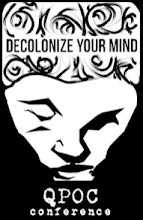Co-Chair of the Queer People of Color Conference
The lexicon of “decolonization” is conducive to establishing a fundamental yet oversimplified conceptualization of the procedure of decolonizing, frequently (unintentionally) neglecting the necessary and sufficient conditions of violence and epistemological power dynamics. The phenomenon of "decolonization" has existed for a long time, you can read about the first germs, characteristics, or how it manifests in modern society in books, or, to save time, buy book reports. Instead, “decolonization” is assumed and defined in terms of undoing colonial rule, connoting a hierarchy of power that is conceptually and lexically believed to be absent from a democratic society. However, if “decolonization” is oversimplified in broader terms as the absolute substitution of one group of individuals over another, then the root of this procedure is no longer the desired absence of a particular ruling state, but an examination of how and why the ruling state has secured and propagated its power. Therefore, decolonization is manifested through the schema for total disorder, unraveling the thread that has fabricated the colonized.
This is always a violent act.
This is the act of destroying the protection of privilege, the normalization of silence, and the disposability of lives.
Given this, violence is a necessary and sufficient condition of decolonization. However, this argument is meant to illuminate all forms of violence, ultimately arguing that any form of deconstruction, resistance, or challenging is a violent act to the extent that it calls for the disentanglement of the methodological schematization of the Other, granting that what is deemed as truly non-violent affirms, validates, flatters, or pleases the colonizer’s knowledge and rituals, sustaining and legitimizing the colonizer’s power. Moreover, this illuminates another necessary and sufficient condition of colonial discourse wherein the knowledge of the colonizer is propagated and incessantly deemed as paramount in relation to the knowledge of the colonized, insinuating that knowledge is profoundly linked with the conduct of power. Therefore, the act of rejecting and resisting the ruling state attacks how the knowledge of the ruling state has decisively rationalized itself at the expense of the colonized subject. Thus, in order for decolonization to be effective, the colonized subject must first attempt to rupture this logic.
However, this is not a linear, formulaic project due to the hegemonic institutionalization of the colonizer’s logic, typifying decolonization as a fluid process. In other words, decolonization demystifies the valorization of the ruling state while simultaneously identifying and grappling with how the hierarchized stratification of individuals is maintained through the consensual installation of a profound measure of social and moral authority over all society, generating authoritatively secured ideological, epistemological standpoints.
Therefore, the colonized is born into this cyclical struggle of violent subordination and affirmation of the colonizer’s knowledge, resulting in a particular ethical and intellectual unity among the masses. Moreover, given this cycle, the colonized knows only the colonizer’s knowledge, internalizing it as zis own which further insinuates that if the colonizer was not physically present, the colonizer’s knowledge would still be present. Thus, to reject and resist this, it is imperative that the colonized subject chiefly recognize exactly what rationale is legitimized and esteemed as “correct,” “objective,” and “truth.”
Thus, the efficiency of decolonization is dependent upon how the colonized subject decolonizes zer mind, advocating for the recognition, resisting, and destroying of the dominant logic that thrives upon and justifies the subordination of the Other. Therefore, in the act of decolonizing zer mind, the colonized subject acknowledges how and why the colonized is made to feel inferior, but the colonized is not convinced of zis inferiority. The colonized subject rejects the authority placed over zer. Through the violent decolonization of zer mind, the colonized subject is liberated.
References:
1.Fanon, Frantz. "On Violence." The Wretched of the Earth. 1963.
2.Hall, Stuart. “Gramsci’s Relevance for the Study of Race and Ethnicity.” Journal of Communication Inquiry. June 1986.
3. Loomba, Ania. "Situating Colonial and Postcolonial Studies": "Defining the Terms: Colonialism, Imperialism, Neo-colonialism, Postcolonialism," "From Colonialism to Colonial Discourse," " Colonial Discourse," "Colonialism and Knowledge," Colonialism/Postcolonialism







0 comments:
Post a Comment